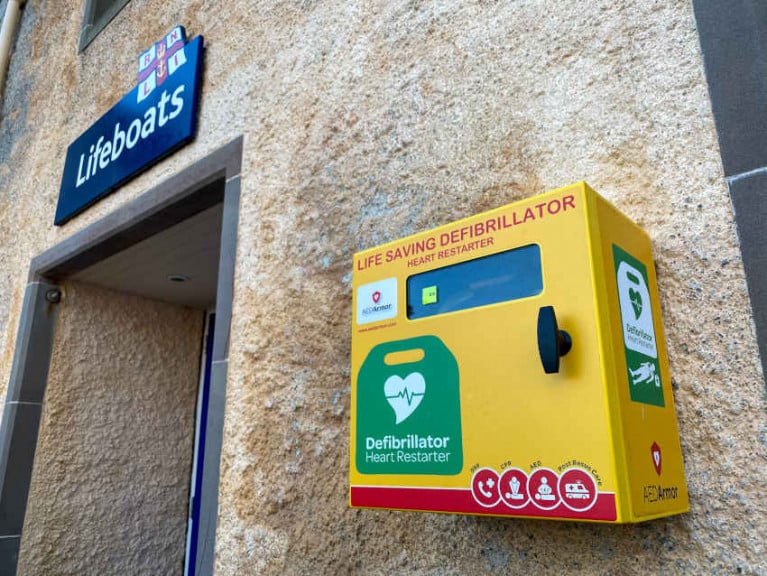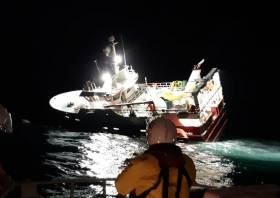Displaying items by tag: lerwick
Lerwick Lifeboat Guild Fundraising Volunteer Steps Down After 38 Years
Bella Irvine has retired from the Lerwick Ladies Lifeboat Guild after 38 years service, since first volunteering for the Shetland Islands RNLI unit in 1982.
At a gathering at RNLI Lerwick lifeboat station to mark the occasion last Tuesday evening (4 February), members of the guild and current lifeboat crew members paid tribute to Bella’s contribution on the committee.
After her first 10 years, Bella was then treasurer for 23 years, from 1992 until 2015. Since then, she has continued to support fundraising events and activities, including volunteering in the RNLI Lerwick shop.
In recognition of her long service, Bella received a RNLI Gold Badge and Bar in 2016.
The guild raises funds for the RNLI towards the operational costs of the Lerwick lifeboat in Scotland's far nothern isles, which relies entirely on public donations.
‘She’s one in a million and will always be welcome in our shop, where she will always find the kettle on’
Throughout the year, the guild organises many events, including the popular Lifeboat Open Day in midsummer and the Lifeboat Ball later in the year. Committee members also attend country shows during the summer months to generate income and to raise the profile of the RNLI.
In 2019, the Lerwick Lifeboat Guild, including funds raised by the men’s committee, raised a total of over £44,000.
Rhoda Watt, joint chair of the Lerwick Ladies Lifeboat Guild and current treasurer, said: “Bella has been absolutely dedicated beyond measure and will be missed on our committee. She’s one in a million and will always be welcome in our shop, where she will always find the kettle on.”
Malcolm Craigie, RNLI Lerwick lifeboat operations manager, said: “The RNLI relies on dedicated fundraisers across the country to provide equipment and training for our volunteer crews, so that we’re ready to respond 24 hours a day.
“On behalf of the lifeboat crew, we’re hugely grateful to Bella for everything she has done for the Lerwick Lifeboat Guild over the last 38 years.”
Defibrillator Installed At Lerwick Lifeboat Station
A cardiac defibrillator has been installed outside Lerwick RNLI’s lifeboat station, to provide essential lifesaving treatment to anyone suffering from a heart attack.
The defibrillator is fitted in a highly visible protective cabinet outside the station door next to the small boat harbour, which is a popular spot for locals and visitors in Scotland’s Shetland Islands throughout the year.
Accessible 24 hours a day, providing an emergency asset for the area, the automated external defibrillator (AED) can monitor the heart rhythm and, if necessary, deliver an electric shock to the heart, which is the most effective treatment for a heart attack.
AEDs can be used by anyone, without the need for any specialist training, as any rescuer will be guided through what to do by the voice commands and display panel.
The defibrillator has been part-funded by a grant from the British Heart Foundation, and a local crowdfunding effort raised the extra money required to purchase the equipment and stainless-steel cabinet necessary to house it.
Lerwick lifeboat crew are particularly thankful to one anonymous donor who gave £900 to the appeal.
Scottish charity Lucky2BHere, which has helped to provide many defibrillators in Shetland, has also provided AED training to the lifeboat crew.
It is thought that next nearest public access defibrillator is around 400 metres away, outside the Stewart Building, while the nearby Lerwick Boating Club has a defibrillator located in their premises.
Darren Harcus, coxswain of RNLI Lerwick, said: “Installing this defibrillator fits well with our function as the charity which saves lives at sea. This will be an important lifesaving asset for the Lerwick waterfront, partly paid for by the local community.
“We’d like to thank all those who have made donations for this defibrillator, the British Heart Foundation who have provided grant funding, Lucky2BHere who have provided support, and our RNLI Estates Team who have dealt with the necessary paperwork to install and provide electrical power to the defibrillator on the building.”
Lerwick Lifeboat Aids Crew Of Grounded Vessel
Lerwick lifeboat launched late Friday night (15 November) to the aid of a fishing vessel which had grounded on rocks just north of the Shetland Islands harbour.
The 26-metre, Inverness-registered trawler was stuck fast and was listing when the Severn-class all-weather lifeboat arrived on scene around 1.40am.
Lerwick Port Authority vessels Knab and Kebister, and the fishing vessel Faithlie, also arrived soon after to assist.
After assessing the damage, attempts by the lifeboat crew to tow the vessel off the rocks on a falling tide were unsuccessful, with two tow lines on the lifeboat snapped in the effort. The other vessels on scene were also unable to free the trawler from the rock.
The nine crew members were taken off the stricken vessel by the lifeboat around 4am and safely returned to Lerwick Harbour, with only minor injuries, and into the care of the ambulance service.
Weather conditions were calm with light winds and a moderate sea swell, with the air temperature just above freezing.
Around 12 hours later, the lifeboat returned to the scene to assist with another attempt to refloat the vessel at high tide, just before 1pm on Saturday.
The Knab and Kebister were successful in pulling the vessel off the rocks on Saturday afternoon and took the vessel under tow into Lerwick Harbour, accompanied by Lerwick lifeboat.
Lerwick RNLI’s deputy coxswain Tommy Goudie said: “The outcome of this grounding could have been a lot worse. Thanks to fair weather and the combined efforts of ourselves and Lerwick Port Authority vessels, the fishing crew are safe, and the vessel is now safely in harbour.
“The crew did the right thing by contacting the coastguard as soon as they knew they needed help. They were wearing survival suits and life jackets and deployed their life raft in case it became necessary. Our crew are always ready to respond and we’re pleased to be able to assist.”
#fireball – Tom Gillard & Richard Anderton (GBR 15081) are the new Fireball European Champions. In today's final day of racing they won two of the three races to win the regatta, after discard, by a 6pt margin writes Cormac Bradley.
In 2nd place overall are Matt Burge & Richard Wagstaff (GBR 15093), followed by David Wade & Tim Hartley (GBR 15113) with these two being separated by 3pts.
The young Irish combination, Barry McCartin & Conor Kinsella (IRL 15114) finished fourth overall, losing out to Wade by a solitary point. However, they will be buoyed by the fact that they took the last race of the regatta to break the stranglehold that the British boats had on racer wins.
In 5th place overall are the Czech combination Jaroslav Verner and Jakub Napravnik (CZE 15110).
Principle Race Officer, Bruce Leask and his team, produced a hat-trick of three-race days to give the fleet a second discard, to the relief of some. Wind today was out of the east and started a bit light but grew stronger as the day wore on, so much so that the "pumping flag" was broken out for the last race.
Burge and Wagstaff's day came unstuck with some wayward results but in truth two race wins today for Gillard & Anderton is where the damage was done to the former's campaign. Wade and Hartley too had a good day with a 2, 3, 3, suite of results.
Among the ladies, Louise McKenna & Hermine O'Keeffe (IRL 14691) in 17th were first with Maja Suter & Thomas Boehm (SUI 14921) 5pts adrift of the Irish combination.
In home fleet terms, Will'm Mouatt and Neil Fraser (SHE 14402) take the honours, their regatta highlight being a 4th place finish in Race 8.
Homecoming Scotland 2014 Fireball European Championships
Lerwick, Shetland. Sail No. R1 R2 R3 R4 R5 R6 R7 R8 R9 Nett
1 Tom Gillard & Richard Anderton GBR 15081 4 2 2 1 3 1 1 1 2 10
2 Matt Burge & Richard Wagstaff GBR 15093 5 1 1 2 1 2 7 5 4 16
3 David Wade & Tim Hartley GBR 15113 2 4 4 4 2 3 2 3 3 19
4 Barry McCartin & Conor Kinsella IRL 15114 1 6 6 3 4 5 4 2 1 20
5 Jaroslav Verner & Jakub Napravnik CZE 15110 3 3 3 5 6 6 8 6 5 31
6 Jiri Paruzek & Jakub Kosvica CZE 14551 8 7 5 6 5 14 3 27 6 40
7 Alex Taylor & Geoff Edwards GBR 15046 6 5 7 7 27 4 5 27 7 41
8 Will'm Mouatt & Neil Fraser SHE 14402 27 11 8 9 9 16 6 4 9 56
9 Scott Nicolson & Roger Goudie SHE 14513 15 8 10 8 7 8 10 9 11 60
10 Frank Miller & Ismail Inan IRL 14713 13 10 11 12 10 9 12 15 12 76
































































